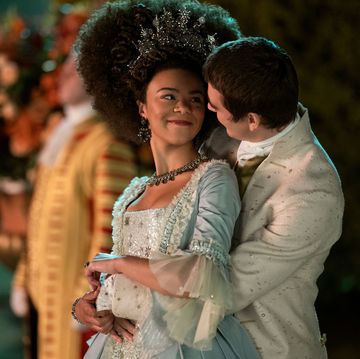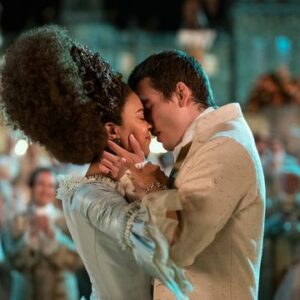
T&C gets a peek inside the jewelry box of the Bridgerton prequel.
“We kept running out of jewelry,” says costume designer Lyn Paolo, mastermind of all the silky shimmering splendor of Queen Charlotte, the highly anticipated Bridgerton prequel that finally dropped on Netflix last week. Because as anyone knows, it takes a lot of diamonds—and pearls and sapphires and rubies and emeralds—to adorn royals (last Saturday’s coronation confirmed it). Factor in the Bridgerton M.O., with its an emphasis on pop culture embellishment—and fun—over stuffy historical fact, and the rocks will most certainly add up.
And yet another challenge? While Bridgerton is an entirely fictional world spun from the early aughts novels of Julia Quinn, Queen Charlotte is loosely based on a real figure—she is already a fixture in the former, as a gossip-loving, outrageously coiffed monarch, but now gets a nuanced backstory of her own—putting this show in the canon of recent TV tales centered on the young lives of history’s legendary queens. For Paolo and co-costume designer Laura Frecon, this required finding the delicate stylistic balance between nodding to the past while maintaining that signature irreverent charm. “On one level we did try to be true to the period, and on another level we wanted to reinvent it,” Paolo says. “We wanted to honor the Bridgerton world, so we came up with this idea of our palette being more like an Impressionist painting.”
She does concede, however, that the bijoux had to be more “on point,” both in its subtle Georgian-era details, but just in sheer volume, too. “We’re dealing with a royal family here,” she says, “not just a well-known family in the Ton.” Which means there had to be jewels—real and costume—created, sourced, and commissioned for suites, parures, and stomachers, to pin onto bodices and to sprinkle in hair. They found exquisite pearls in Germany, had costume tiaras made in Italy, even gave up pieces of their own hair to put into mourning jewels.

They also turned to Emily Satloff, whose brand, Larkspur & Hawk, is a sparkling celebration of Georgian lapidary techniques. Her quartz-laden pieces, which infuse the 18th-century practice of foil-backing stones with a modern sensibility, were already so perfect for Charlotte’s aesthetic that Paolo and Frecon simply had to dig into her archives.
“It was like my wheelhouse,” Satloff says. “When I saw their initial mood board I was like, ‘This sings to me.’ And what was great was they weren’t asking me to design a collection. They knew what I had and what my ethos was.”
Satloff’s love of Georgian gems predates the founding of her modern jewelry company in 2008. In a former life she was an antique jewelry dealer specializing in the era. After years spent educating clients on foiling, the transition to design was an organic one. “I’m inspired by the 18th century in a way that I revere it, but I don’t literally reproduce it,” she says, essentially echoing the philosophy of the Bridgerton/Queen Charlotte universe.
Foiling is but one example of the sort of innovation that featured jewelry in Georgian England. Take mourning gems: Queen Victoria may have popularized the concept, wearing sweet remembrances of yanked ones containing strands of their hair, but they were popular during Charlotte’s time, too, as were giardinetti rings. This was also a period of exploration and discovery. “Mines in Brazil were opening up and more stones were ready available,” Satloff says. “Diamonds and pearls were absolutely popular but so were garnets, emeralds, rubies, spinel, coral.”
And jewelry became far more democratic. There was the invention of paste (surviving glass baubles from that epoch can fetch thousands today) and other innovations like using cut steel. Even candlelight: “You think candlelight has been around forever, but candles were improved in Georgian times to the point where not just royalty but wealthy members of society could have evening events,” she says. Enter: evening bijoux.
This is all to say that jewelry enthusiasts may have particular fun watching Queen Charlotte. And to those who take issue with the production’s Impressionist spin? “People might say it wasn’t literal, it wasn’t period, they shouldn’t have done this,” Satloff says. “I hope that they can see that it actually was in so many ways because of the craftsmanship. My rivière might not have been the literal rivière that Queen Charlotte wore, but it’s totally relevant for the Georgian era.”